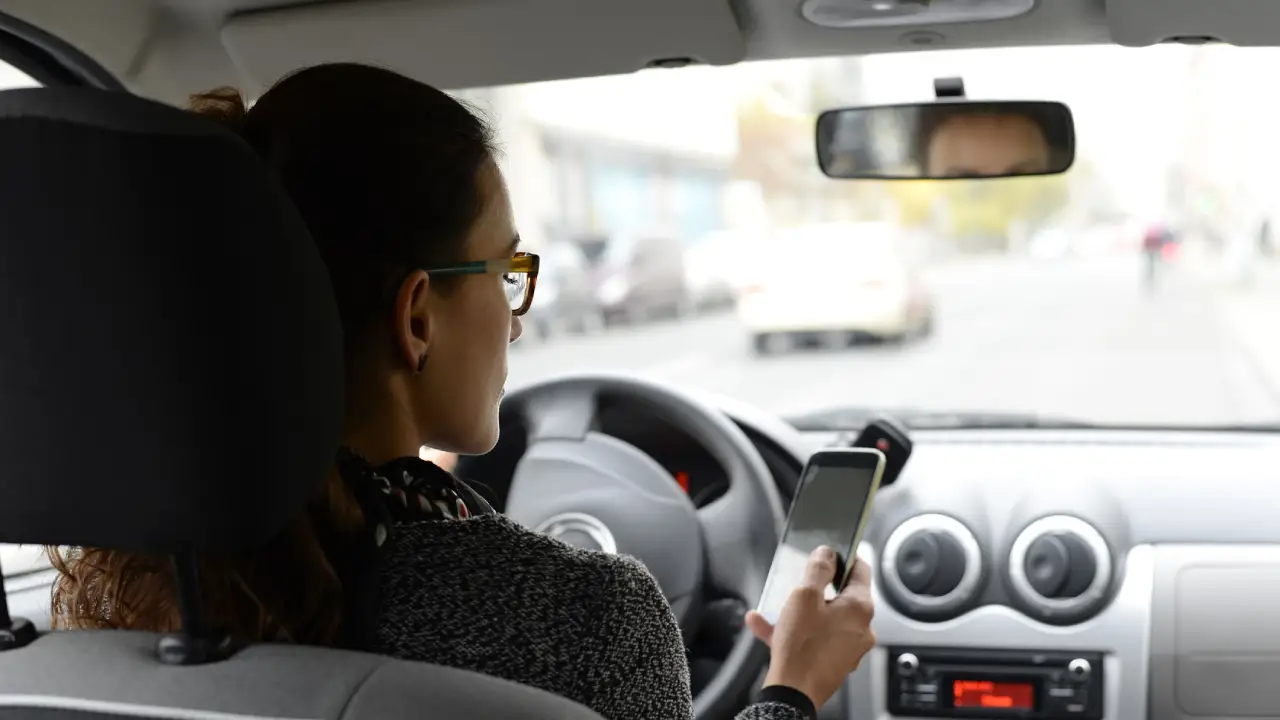DISTRACTED DRIVING ACTIONS AND CONSEQUENCES (2023)

Driving requires one’s full attention and focus, but it’s all too easy to become distracted by other things, such as smartphones, passengers, food, or even daydreaming. Distracted driving is a major safety concern on the roads today, leading to countless accidents, injuries, and fatalities. In this article, we’ll explore the actions that contribute to distracted driving and their consequences, as well as how to prevent distracted driving.
What is distracted driving?
Distracted driving is any activity that takes your attention away from driving, including visual, auditory, cognitive, and manual distractions. These distractions can increase the risk of an accident and put yourself and others in danger. According to the National Highway Traffic Safety Administration (NHTSA), distracted driving claimed 3,142 lives in 2019 in the United States alone.
Types of distractions while driving
Visual distractions
Visual distractions are anything that takes your eyes off the road. Examples include looking at billboards, checking your phone, applying makeup, or reaching for something in the car.
Auditory distractions
Auditory distractions are anything that takes your attention away from listening to the sounds on the road. Examples include talking on the phone, listening to loud music, or hearing navigation instructions.
Cognitive distractions
Cognitive distractions are anything that takes your mind off driving. Examples include daydreaming, having a conversation, or worrying about personal problems.
Manual distractions
Manual distractions are anything that takes your hands off the wheel. Examples include eating or drinking, smoking, or adjusting the radio or air conditioning.
Common distractions while driving
Using smartphones or other devices
One of the most common distractions while driving is using smartphones or other electronic devices. Texting, calling, browsing social media, or checking emails can take your eyes, hands, and mind off the road. It’s illegal to use a handheld device while driving in many states and doing so can result in a fine, license suspension, or even jail time.
Eating or drinking while driving
Eating or drinking while driving can cause spills or choking hazards, and it can also take your hands and eyes off the wheel. It’s best to eat before or after driving or to pull over to a safe location if you need to eat or drink.
Talking to passengers
Passengers can be a source of distraction while driving, especially if they engage in heated conversations or behave in a way that makes the driver uncomfortable or nervous. It’s important to stay focused on the road and to ask passengers to refrain from distracting activities.
Adjusting music or GPS
Adjusting music or GPS settings while driving can take your eyes and mind off the road, and it can also cause you to swerve or brake suddenly. It’s best to set your music and GPS settings before you start driving or to pull over to a safe location.
Daydreaming or being lost in thought
Daydreaming or being lost in thought is a common distraction while driving, and it can be especially dangerous because it’s not always apparent to others on the road. It’s important to stay alert and focused on the road at all times and to pull over to a safe location if you need to take a break or refocus.
Consequences of distracted driving
Distracted driving can have serious consequences, both for the driver and others on the road. Some of the potential consequences include:
Accidents and injuries
Distracted driving can lead to accidents, injuries, and fatalities. According to the NHTSA, in 2019, 9% of fatal crashes involved distracted drivers. Even a split-second of distraction can be enough to cause a collision or to miss an important traffic signal.
Legal and financial consequences
Distracted driving can result in legal and financial consequences, such as fines, points on your license, higher insurance premiums, or even criminal charges if someone is injured or killed as a result of your distraction.
Emotional and psychological effects
Distracted driving can also have emotional and psychological effects, such as guilt, anxiety, or depression. Knowing that your distraction caused an accident or injury can be a heavy burden to carry, and it can also affect your relationships and mental health.
Read More: GARDASIL VACCINE LINKED TO OVARIAN FAILURE DEATH (2023)
Preventing distracted driving
Preventing distracted driving starts with awareness and education. Here are some tips for avoiding distractions while driving:
Turn off or silence devices while driving
To avoid the temptation of using your phone or other devices while driving, turn it off or put it on silent mode before you start driving. If you need to use it, pull over to a safe location first.
Eat before or after driving
To avoid the temptation of eating or drinking while driving, make sure to eat before or after driving. If you need to eat or drink, pull over to a safe location first.
Set music and GPS before driving
To avoid the temptation of adjusting music or GPS settings while driving, set them before you start driving or use voice commands if your device supports them.
Avoid multitasking while driving
To avoid cognitive and manual distractions, avoid multitasking while driving. Focus on the road and the task at hand, and save other activities for when you’re not behind the wheel.
Take breaks during long drives
To avoid fatigue and boredom, take breaks during long drives. Get out of the car, stretch your legs, and take a rest before getting back on the road.
Read More: Pittsburgh Councilwoman And Her Husband Recovering From Accident (2023)
Conclusion
Distracted driving is a serious issue that affects us all. By understanding the types of distractions that can occur while driving and taking steps to prevent them, we can all do our part to make the roads safer for everyone.



